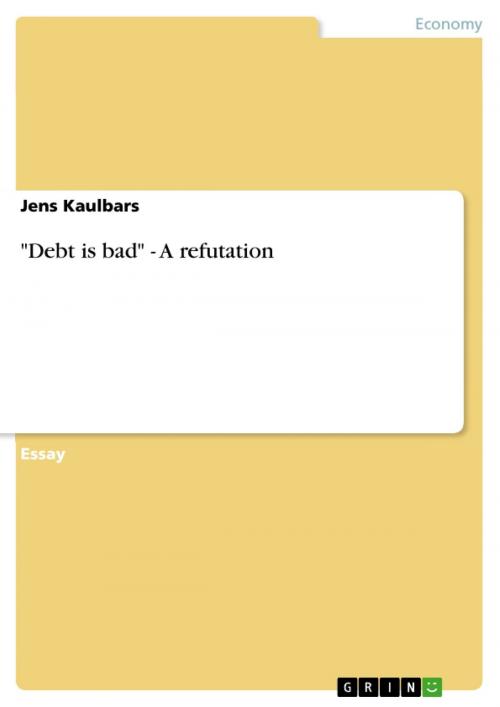| Author: | Jens Kaulbars | ISBN: | 9783638821490 |
| Publisher: | GRIN Publishing | Publication: | July 9, 2007 |
| Imprint: | GRIN Publishing | Language: | English |
| Author: | Jens Kaulbars |
| ISBN: | 9783638821490 |
| Publisher: | GRIN Publishing |
| Publication: | July 9, 2007 |
| Imprint: | GRIN Publishing |
| Language: | English |
Essay from the year 2006 in the subject Business economics - Investment and Finance, grade: 1,0, University of Applied Sciences Bremerhaven, course: Financial Management, 5 entries in the bibliography, language: English, abstract: Throughout all the times since humans started to exchange goods for trade, there has been the common opinion that debt is a bad, sometimes even shameful thing to have. Thus it is not astonishing that in Shakespeares' Hamlet Lord Polonius advises his son Laertes: 'Neither a borrower nor a lender be' (William Shakespeare, 1598-1602, Act 1 Scene 3), for this clearly expresses the point of view people had and many still adopt. However this would mean a generalization of the term 'debt', which cannot be made that easily: 'To say that all debt is bad is to say that all debt is alike - which is simply not true' (Tim Cestnick, 2005, p.16).
Essay from the year 2006 in the subject Business economics - Investment and Finance, grade: 1,0, University of Applied Sciences Bremerhaven, course: Financial Management, 5 entries in the bibliography, language: English, abstract: Throughout all the times since humans started to exchange goods for trade, there has been the common opinion that debt is a bad, sometimes even shameful thing to have. Thus it is not astonishing that in Shakespeares' Hamlet Lord Polonius advises his son Laertes: 'Neither a borrower nor a lender be' (William Shakespeare, 1598-1602, Act 1 Scene 3), for this clearly expresses the point of view people had and many still adopt. However this would mean a generalization of the term 'debt', which cannot be made that easily: 'To say that all debt is bad is to say that all debt is alike - which is simply not true' (Tim Cestnick, 2005, p.16).















